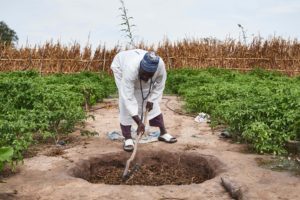Welcome to the Agroforestry Word of the Week blog!
We’re making it easy for you to get into the world of agroforestry by sharing common agroforestry terms and examples with you every Wednesday. Subscribe here to receive your weekly word and start building your agroforestry vocabulary and knowledge.
Composting - /com-post-iNG/ - noun
April 10th, 2019
Definition: The process by which organic materials considered to be waste products are recycled and decomposed. Together, the organic materials create nutrient-rich, organic matter (compost) that helps fertilize soils.
5 key elements needed for composting:
Carbon
Nitrogen
Air
Water
Bacteria
Did you know? Composting benefits go far beyond soil fertilization. Compost feeds an immense number of beneficial insects and microbes that in turn enhance the soil structure. These organisms burrow into the ground, creating networks of tunnels around the root systems of the plants, improving aeration and water infiltration. This allows for better root growth, enhances water drainage in clay soils, and improves water and nutrient retention in sandy soils.

Carbon
Nitrogen
Air
Water
Bacteria

 United States
United States
Comments